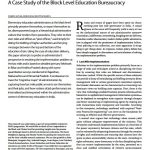
A Digression into Ethical Dilemmas
27 September 2016
Returning from an annual vacation, I was immediately informed that my blog had to resume forthwith. Apparently, the current blog series on confidential reports had generated much interest, and my adoring reading public was anxious for more. In order to exacerbate my guilt, I was told by the Grand Mufti of the Accountability Initiative website that continuity had been maintained in my absence, by recirculating earlier blogs of mine on leadership in the IAS. There is nothing more disturbing for a blogger to be told that his blogs are being recycled. It is an open threat to future relevance. It screams out, ‘we’ve got all your best lines already, so you could leave’.
Anyway, I had had plenty of time to think of what to write in my blogs during my month of absence. Holidays are good times to introspect, and I have never been a fan of the ‘get away from it all’ variety of breaks.
Just before I left, a former colleague, Nivedita Raju, pointed out that the system of confidential appraisal had undergone some major changes since I was in the government and that one of the changes introduced was that peers and subordinates would also have an opportunity to comment on the performance of the officer being appraised.
The more I thought about it, the less I thought it would work.
I also realised that that notion of mine is terribly unfair, because I would be pre-judging the change based on my preconceived notions of how hierarchies function in the government.
But let me state out my case.
Have you seen how government officers of a certain level in the government behave when they meet each other, particularly in case they do not have the faintest idea of who the other individual is? This happens quite frequently; government officers are not a close knit tribe where everybody knows everybody else. Particularly when officers come from different backgrounds and States, the chances are more likely than not, that they do not know each other well enough to begin to slap each other’s backs.
When two officers who know not each other, meet, a process is set in motion that would put the mating rituals of Sarus cranes to shame. Through a set of polite enquiries, often so subtle that they do not raise the suspicions of the one who introduces the two, a positioning game is played.
Let me describe how it works. Let us presume that IAS officer ‘A’ meets IAS officer ‘B’ at a wedding. They are introduced to each other by a busy host, with a quick opening statement that merely reveals to the other, that they both belong to the IAS. However, that is akin to a biologist describing an airborne creature as some kind of flying thingie; it does not enable the stickler for detail to conclude whether the said airborne object is a bird, a bat, Superman, or an UFO.
IAS officers are sticklers for detail. They need to find out quickly as to whether the individual opposite them are (a) Senior or (b) Junior to them and/or whether they are (c) Direct Recruits or (d) Promotees into the service. The nub of the matter is to find out the status and seniority of the other. However, a blunt approach is considered unsporting. It is distinctly rude to ask each other ‘what is your batch?’ – referring to the year of recruitment – thereby completing fifty percent of the positioning game in a flash.
No, the approach is far more subtle. A well worked gambit is for one person – usually the person who in appearance seems more decrepit than the other, and therefore, presumably the more senior of the two – to seek from the other the whereabouts of his batch-mates.
Thus for example, if I were to meet someone who is introduced to me as an IAS officer from another State, and who seems to be in a better state of physical preservation than I am, I would casually enquire from him how my batch-mates in his state were doing. That sets in motion a smooth and nearly instantaneous process of positioning. The moment I mention names, the opposite party discovers in an instant, my batch and thereafter, he can determine whether I am senior enough to him to be treated deferentially, or considered a peer, or that, in spite of my aged looks, that I am actually – a ghastly thought – junior to him.
When positioning is all important even in the most informal of contacts between officers, how can positions not interfere with objective, all-round appraisals?
There is one other reason why I think that a peer based appraisal system might be compromised – ambition. Everybody has it. And when the room at the top is restricted, it becomes the prime influencer of any behaviour; it does not recuse itself when 360 degree appraisals are undertaken.
More of how ambition, of both the person being appraised and of the appraiser, might distort reviews of performance by peers and sub-ordinates, in my next blog.




